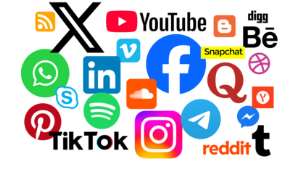
Social media has become a powerful tool for communication, debate, and information sharing in Ghana. Platforms like Facebook, X (formerly Twitter), TikTok, and YouTube allow people to express their views on politics, entertainment, and national issues. However, a growing concern is the increasing tendency of social media hosts and users to resort to insults rather than engaging in meaningful discussions when disagreements arise. This culture of verbal attacks is damaging public discourse, promoting division, and discouraging constructive debates.
Why Do Ghanaians Resort to Insults on Social Media?
Several factors contribute to the rise of insults and online hostility in Ghanaian social media spaces:
Lack of Tolerance for Opposing Views
Many Ghanaians struggle to accept differing opinions. Instead of responding with logic and facts, some individuals choose insults as a way to silence opposing voices.
Anonymity and Lack of Accountability
Social media allows people to hide behind fake profiles or distance themselves from the consequences of their words. This anonymity encourages rude and offensive behavior.
Influence of Content Creators and Hosts
Some social media hosts create content that thrives on insults, mockery, and personal attacks rather than objective discussions. Their followers adopt this behavior, making it the norm.
Political and Fanatic Bias
Political debates in Ghana, especially on social media, are highly charged. Supporters of political parties or celebrities often refuse to engage in reasonable conversations and instead insult opponents.
Frustration and Emotional Reactions
Economic hardship, unemployment, and social frustrations sometimes push people to vent their anger online, attacking others instead of addressing issues objectively.
The Effects of Insult-Driven Social Media Culture
The normalization of insults and personal attacks on Ghanaian social media has several negative consequences:
The Way Forward: Promoting Healthy Online Discussions
To change this negative trend, individuals and social media content creators must adopt more responsible ways of engaging online.
Encourage Respectful Debates
Ghanaians must learn to engage in discussions with respect, even when opinions differ. Challenging views should be done with facts, not insults.
Social Media Hosts Must Lead by Example
Those who host discussions and content on social media should promote respectful conversations rather than encouraging insults and mockery for views.
Implement Stricter Platform Regulations
Social media platforms should take action against users who consistently use abusive language, enforcing bans or restrictions on their accounts.
Educate People on Digital Etiquette
Schools, organizations, and public figures should educate Ghanaians on the importance of constructive online engagement.
Encourage Legal Consequences for Cyberbullying
The enforcement of Ghana’s cyber laws should be strengthened to hold people accountable for extreme online abuse.
Conclusion
Social media should be a platform for learning, debate, and engagement, not a space for insults and personal attacks. The increasing culture of hostility on Ghanaian social media discourages healthy conversations and promotes unnecessary conflicts. It is time for individuals, content creators, and online communities to embrace maturity, tolerance, and respect in their interactions. Constructive dialogue will help Ghana progress, while insults will only divide the nation further.


